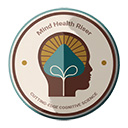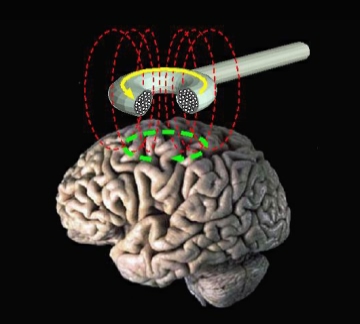rTMS, or repetitive Transcranial Magnetic Stimulation, is a non-invasive procedure that uses magnetic fields to stimulate specific areas of the brain. Commonly used to treat depression and certain other neurological conditions, rTMS offers an alternative for those seeking treatments without medication. The procedure is safe, FDA-approved, and conducted under professional supervision.
rTMS stands for "Repetitive Transcranial Magnetic Stimulation." It's a non-invasive medical procedure that uses magnetic fields to stimulate nerve cells in the brain . This technique is often used in the treatment of various neurological and psychiatric conditions, including depression, anxiety, and certain movement disorders. rTMS involves placing a coil near the scalp to deliver magnetic pulses to specific areas of the brain , which can help modulate brain .
rTMS (Repetitive Transcranial Magnetic Stimulation) has been associated with several potential benefits, although its effectiveness can vary from person to person and depending on the specific condition being treated. Some of the potential benefits include:
1. Treatment of Depression: rTMS is FDA-approved for the treatment of major depressive disorder when other treatment s haven't been effective. It can help alleviate depressive symptoms and improve mood.
2. Reduced Anxiety: In some cases, rTMS may be used to treat anxiety disorders. It can help regulate brain activity in areas associated with anxiety and lead to symptom relief.
3. Pain Management: rTMS has been explored as a potential tool for managing chronic pain conditions, such as fibromyalgia and neuropathic pain.
4. Improvement in Motor Function: It has been used to assist in motor rehabilitation for conditions like stroke, Parkinson's disease, and multiple sclerosis, helping improve muscle control and coordination.
5. Research and Understanding: rTMS is also used in research to better understand brain function. It can help scientists study the effects of stimulating specific brain regions on various cognitive and emotional processes.
It's important to note that rTMS may not be suitable for everyone, and its effectiveness can vary. It's typically administered under the guidance of a neurologist who assesses the individual's condition and determines whether rTMS is an appropriate treatment option. Like any medical procedure, it carries potential risks and side effects, so a thorough evaluation by a healthcare provider is essential.
rTMS (Repetitive Transcranial Magnetic Stimulation) has been investigated for its potential to improve concentration, attention, and memory, Here's a brief overview:
1. Attention and Concentration: Some studies have suggested that rTMS may have a positive impact on attention and concentration in certain individuals, particularly when targeting specific brain regions associated with attentional processes.
2. Memory: rTMS has been explored for its potential to enhance memory, especially in individuals with memory impairments due to conditions like Alzheimer's disease or traumatic brain injury. It also has great beneficial in enhancing memory power in healthy individuals without specific side effects.
It's important to note that the effects of rTMS on cognitive functions can vary widely among individuals. Additionally, the specific stimulation parameters, such as the frequency, intensity, and location of stimulation, can significantly influence outcomes.
If you're interested in using rTMS to improve cognitive functions like concentration, attention, or memory, it's crucial to consult with a Neurologist who specializes in neuromodulation therapies. They can assess your specific situation and discuss whether rTMS is a suitable option for your cognitive enhancement goals. Additionally, cognitive training, lifestyle changes, and other non-invasive interventions may also be considered as part of a comprehensive approach to improving cognitive function.
Repetitive Transcranial Magnetic Stimulation (rTMS) has been studied as a potential treatment for alcohol use disorder (AUD). Some research suggests that rTMS may have beneficial effects in helping individuals with AUD reduce their alcohol consumption and cravings
Repetitive Transcranial Magnetic Stimulation (rTMS) is used as a therapeutic tool to modulate brain activity and has shown promise in improving mood, particularly in cases of treatment -resistant depression. It involves the application of magnetic pulses to specific areas of the brain , which can help regulate mood and alleviate symptoms of depression.
While some studies suggest that rTMS may indirectly affect anger control by improving overall mood and emotional regulation, it’s typically considered a primary or direct treatment for anger management. If you’re seeking help with anger control, it’s usually more effective to consult with neurologist for the best specific solution proper to you.
Repetitive Transcranial Magnetic Stimulation (rTMS) is sometimes used as a treatment option for depression and anxiety disorders, particularly in cases where standard treatment s like antidepressant medications or psychotherapy have not been effective or well-tolerated. The potential effects of rTMS in decreasing the need for antidepressant and anti-anxiety medications can vary from person to person.
Here’s how rTMS can be related to medication management:
1. Reducing Medication Dependency: For some individuals, successful rTMS treatment may lead to a reduction in the need for antidepressant or anti-anxiety medications. In such cases, a healthcare provider may gradually taper down the medication under their supervision.
2. Adjunct to Medication: In other cases, rTMS may be used as an adjunct treatment alongside medication. This combination approach can sometimes provide better results than either treatment alone.
3. Alternative for Non-Responders: When individuals do not respond well to medication or experience side effects, rTMS can be explored as an alternative or augmentative treatment .
4. Maintenance Therapy: After successful rTMS treatment , some individuals may continue to take a lower dose of medication as a maintenance therapy to prevent relapse.
Repetitive Transcranial Magnetic Stimulation (rTMS) is not a standard or established treatment for addiction to medications like pregabalin. Addiction to pregabalin or any substance typically requires a comprehensive approach that may include medical, psychological, and behavioral interventions.
If you or someone you know is struggling with pregabalin addiction , it's crucial to seek help from a Neurologist or addiction specialist. They can assess the severity of the addiction , provide guidance on withdrawal management if necessary, and create a tailored treatment plan. Treatment options for substance addiction often include:
1. Detoxification: In cases of physical dependence, a medically supervised detoxification process may be required to safely manage withdrawal symptoms.
2. Behavioral Therapy: Therapies like cognitive-behavioral therapy (CBT) and contingency management can help address the psychological aspects of addiction and develop coping strategies.
3. Support Groups: Participating in support groups or 12-step programs can provide valuable peer support and accountability.
4. Medication-Assisted Treatment (MAT): In some cases, medications may be prescribed to help reduce cravings and support recovery. However, this would be determined by a healthcare provider based on the specific substance and individual needs.
5. Counseling and Therapy: Individual and group counseling can address underlying issues contributing to addiction and teach healthier coping mechanisms.
6. Lifestyle Changes: Developing a healthy and supportive lifestyle that promotes recovery is essential.
While rTMS has shown promise in treating other conditions like pregabalin addiction . It's important to consult with a Neurologist who specializes in neuromodolation for guidance on the most appropriate treatment approach for addiction .
Chat on whatsapp for rTMS Request : 00971547905274


0 Comments